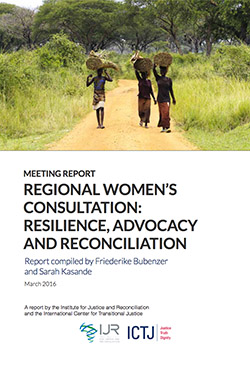
Regional Women’s Consultation: Resilience, advocacy and reconciliation
The experiences shared at the meeting by women survivors and activists from Kenya, Uganda and South Sudan demonstrate that there are linkages between jointly pursuing redress and resilience. At the meeting, women survivors in these three countries clearly articulated how they had built resilience using different sources, including community peersupport structures, collective organising, local knowledge and spirituality. This has, in turn, empowered them to mobilise and collectively demand redress. Resilience is often the driving force behind advocacy for reparations and other forms of redress. Resilience facilitates the transition that people undergo from being passive victims to becoming rights advocates and activists. Resilience has also motivated women survivors to lobby for the integration of a gender perspective in different transitional justice mechanisms successfully. Participants highlighted the need for local and international peacebuilding and development interventions to take into account the rich, but often hidden, indigenous structures that contribute so significantly to individual and community resilience. Conducting further research into these social structures to understand fully how they operate is an important starting point. Building on relationships, structures and processes that work to strengthen communities, even if they have been weakened or have changed during conflict, may contribute to the sustainability of local, national and regional peacebuilding architectures.
Pages: 22
Date of publication: August 2016
By: Friederike Bubenzer and Sarah Kasande




